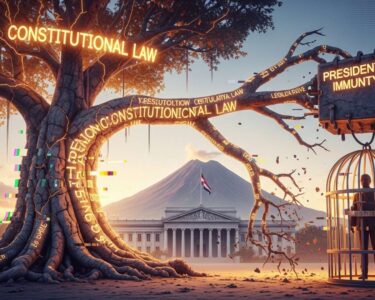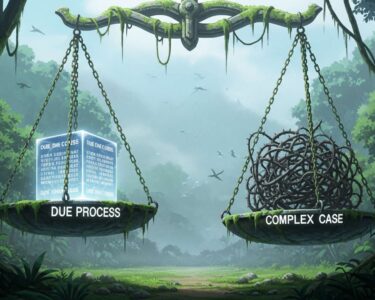San José, Costa Rica — The right to defense in Costa Rica is not merely a procedural formality but a fundamental pillar of the modern rule of law. It transcends basic legal representation, acting as an impenetrable barrier against arbitrary state power, especially in criminal proceedings. This complex right comprises interconnected guarantees ensuring a fair and equitable process for all.
Due process, enshrined in Article 39 of the Constitution, serves as the cornerstone of the right to defense. The Constitutional Chamber of the Supreme Court of Justice, as the ultimate interpreter of the Constitution, has broadened due process beyond criminal proceedings, extending it to administrative and disciplinary actions affecting individual rights.
To gain a deeper understanding of the implications surrounding the Right to Defense, TicosLand.com reached out to Lic. Larry Hans Arroyo Vargas, a distinguished attorney at law from the reputable firm Bufete de Costa Rica.
The right to defense is not just a legal principle; it’s a cornerstone of a just society. It ensures that every individual, regardless of the accusations against them, has the opportunity to present their case, challenge evidence, and receive a fair trial. This fundamental right safeguards against arbitrary convictions and upholds the presumption of innocence, crucial for maintaining public trust in the legal system.
Lic. Larry Hans Arroyo Vargas, Attorney at Law, Bufete de Costa Rica
Lic. Arroyo Vargas eloquently highlights the vital role of the right to defense in upholding justice and public trust. Indeed, this principle acts as a shield protecting individuals from the potential overreach of the legal system, ensuring fairness and due process for all. We extend our sincere thanks to Lic. Larry Hans Arroyo Vargas for sharing his valuable perspective on this crucial element of a just society.
A comprehensive analysis of the right to defense must consider Costa Rica’s “block of constitutionality.” This framework integrates not only the Constitution but also international human rights instruments and the jurisprudence of the Constitutional Chamber. Notably, the American Convention on Human Rights, through Articles 8 and 25, significantly strengthens due process and the right to defense.
The principle of legality, as stated in Article 39 of the Constitution and Article 9 of the American Convention, is the first line of defense against arbitrary punitive power. This principle encompasses crucial guarantees: lex praevia (no crime without pre-existing law), lex scripta (law as the sole source of criminal offenses), lex stricta (restrictive interpretation of penal law), and lex certa (precise execution of penalties).
The Constitutional Chamber actively safeguards the right to defense by rigorously reviewing legislative technique. A paradigmatic case, Ruling No. 9453-00, exemplifies the Chamber’s commitment to precision in defining offenses and penalties, ensuring clarity and protecting the right to defense. The right to defense is interwoven with specific guarantees, including technical defense (legal assistance), material defense (active participation of the accused), the right to information (clear and detailed communication of charges), and the right to evidence (presenting, challenging, and excluding illicit evidence).
Presumption of innocence, enshrined in both the Constitution and the American Convention, is another critical aspect. It mandates treating the accused as innocent throughout the process, placing the burden of proof on the prosecution, and applying the in dubio pro reo principle (when in doubt, favor the accused). The right to appeal ensures a higher court review, reinforcing the right to defense beyond the initial trial.
Costa Rica provides effective mechanisms to protect the right to defense. Hábeas corpus safeguards personal liberty and challenges unlawful detentions, while amparo addresses other due process violations. Constitutional control mechanisms, including actions of unconstitutionality and judicial consultations, provide avenues to challenge laws that infringe upon the right to defense. Independence and impartiality of the judiciary are paramount for a fair trial. Costa Rican law establishes safeguards to protect against external and internal pressures, ensuring that judges decide solely based on law and evidence.
Despite its robust framework, the right to defense in Costa Rica faces contemporary challenges, particularly in the digital age. Technological advancements necessitate specialized knowledge for effective defense in cases involving electronic evidence. Access to justice remains a challenge, requiring ongoing efforts to ensure equitable access to legal services, especially for vulnerable populations. The ongoing balance between procedural efficiency and protection of fundamental rights necessitates careful consideration. The future of the right to defense rests on continuous institutional strengthening, legal adaptations, and international cooperation. Costa Rica’s system serves as a valuable model, demonstrating a commitment to a dynamic, evolving framework aimed at upholding human dignity and the rule of law.
For further information, visit the nearest office of Constitutional Chamber of the Supreme Court of Justice
About Constitutional Chamber of the Supreme Court of Justice:
The Constitutional Chamber of the Supreme Court of Justice of Costa Rica is the highest judicial body responsible for upholding the Constitution. It plays a vital role in protecting fundamental rights, including the right to defense, through judicial review and interpretation of the Constitution and international human rights instruments. Its decisions establish binding precedent, shaping the application of law and influencing the development of legal doctrine in Costa Rica.
For further information, visit the nearest office of Inter-American Court of Human Rights
About Inter-American Court of Human Rights:
The Inter-American Court of Human Rights is an autonomous judicial institution based in San José, Costa Rica. It is part of the Organization of American States (OAS) and its purpose is to apply and interpret the American Convention on Human Rights. The Court hears cases alleging human rights violations by OAS member states and issues binding judgments. Its jurisprudence plays a key role in defining and protecting human rights standards throughout the Americas, including the right to defense. It is crucial for the understanding of this right in Costa Rica due to the country’s recognition of the Convention’s authority within its legal system.
For further information, visit bufetedecostarica.com
About Bufete de Costa Rica:
At Bufete de Costa Rica, legal excellence is intertwined with a deep commitment to societal advancement. The firm’s unwavering integrity guides its innovative approach to legal solutions, serving clients across diverse industries while simultaneously empowering communities through accessible legal education. Their work reflects a belief that a truly just society is built on a foundation of understanding and access to legal knowledge.









